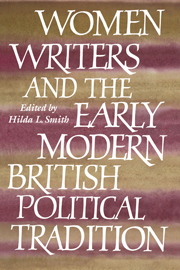Book contents
- Frontmatter
- Contents
- List of contributors
- Preface
- Introduction: Women, intellect, and politics: their intersection in seventeenth-century England
- Part I Women's political writings, 1400–1690
- Part II Women's political and philosophical writings, 1690–1800
- Part III The intellectual context and economic setting for early modern women
- Part IV Early modern legal and political prescriptions for women
- Introduction to Part IV
- 13 The politics of identity and monarchic government in France: the debate over female exclusion
- 14 The Holy Roman Empire: women and politics beyond liberalism, individual rights, and revolutionary theory
- 15 Women as sextons and electors: King's Bench and precedents for women's citizenship
- 16 “To be some body”: married women and The Hardships of the English Laws
- Conclusion: women's writing, women's standing: theory and politics in the early modern period
- Index
16 - “To be some body”: married women and The Hardships of the English Laws
from Part IV - Early modern legal and political prescriptions for women
Published online by Cambridge University Press: 04 August 2010
- Frontmatter
- Contents
- List of contributors
- Preface
- Introduction: Women, intellect, and politics: their intersection in seventeenth-century England
- Part I Women's political writings, 1400–1690
- Part II Women's political and philosophical writings, 1690–1800
- Part III The intellectual context and economic setting for early modern women
- Part IV Early modern legal and political prescriptions for women
- Introduction to Part IV
- 13 The politics of identity and monarchic government in France: the debate over female exclusion
- 14 The Holy Roman Empire: women and politics beyond liberalism, individual rights, and revolutionary theory
- 15 Women as sextons and electors: King's Bench and precedents for women's citizenship
- 16 “To be some body”: married women and The Hardships of the English Laws
- Conclusion: women's writing, women's standing: theory and politics in the early modern period
- Index
Summary
In 1735 an anonymous woman published a small volume entitled The Hardships of the English Laws in Relation to Wives … in an Humble address to the Legislature. Although it has received little attention from scholars, its publication drew sufficient notice at the time to be excerpted as a leading essay in May and June in the Gentleman's Magazine. In a mere seventy pages the work addresses the current feminist issues of education, property, maternity, and dependency using arguments based on moral philosophy, political and constitutional theory, scripture and theology. It manages to convey both outraged protest and rational acceptance of the social order, emphasizing the contradictory tension between the human moral responsibility of women and their subordination as wives. The author's interpretational framework might be called “Christian feminist.” Women's subordination is the just outcome of Eve's first disobedience; but women have souls, they have the right to control their talents, their fortunes, their children, and most importantly their property in their own bodies and minds. The laws of marriage and of God may impose subordination, but the subordinate wife retains her full humanity and moral responsibility.
The author articulates no specific program of reform. That will only come from men's willingness to modify the “despotic” powers that the law gives them.
- Type
- Chapter
- Information
- Women Writers and the Early Modern British Political Tradition , pp. 343 - 362Publisher: Cambridge University PressPrint publication year: 1998
- 3
- Cited by

